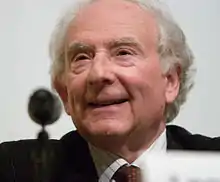Leon Cooper
Leon N Cooper[1] (born February 28, 1930) is an American physicist. He won the Nobel Prize for Physics with John Bardeen and John Robert Schrieffer in 1972. He helped developed the BCS theory of superconductivity.[2][3]
Leon N Cooper | |
|---|---|
 Cooper in 2007 | |
| Born | February 28, 1930 Bronx, New York, U.S. |
| Alma mater | Columbia University (B.A. 1951, M.A. 1953, Ph.D. 1954) |
| Known for | Superconductivity Cooper pairs |
| Awards | Nobel Prize in Physics (1972) Comstock Prize in Physics (1968) |
| Scientific career | |
| Fields | Physics |
| Institutions | Brown University |
| Doctoral advisor | Robert Serber |
He is also the namesake of the Cooper pair and co-developer of the BCM theory of synaptic plasticity.[4]
References
- Many printed materials, including the Nobel Prize website, have referred to Cooper as "Leon Neil Cooper". However, the middle initial N does not stand for Neil, or for any other name. The correct form of the name is, thus, "Leon N Cooper", with no abbreviation dots
- "Superconductivity". CERN official website. CERN.
- Weinberg, Steven (February 2008). "From BSC to the LHC". CERN Courier. 48 (1): 17–21.
- Bienenstock, Elie (1982). "Theory for the development of neuron selectivity: orientation specificity and binocular interaction in visual cortex". The Journal of Neuroscience. 2 (1): 32–48. doi:10.1523/JNEUROSCI.02-01-00032.1982. PMC 6564292. PMID 7054394.
This article is issued from Wikipedia. The text is licensed under Creative Commons - Attribution - Sharealike. Additional terms may apply for the media files.